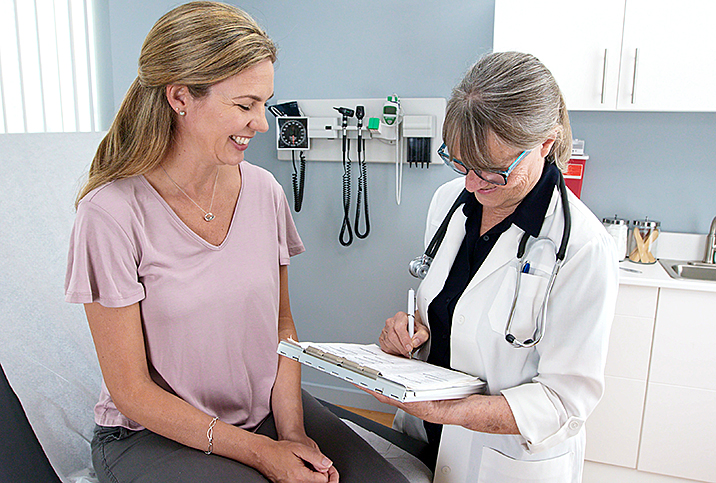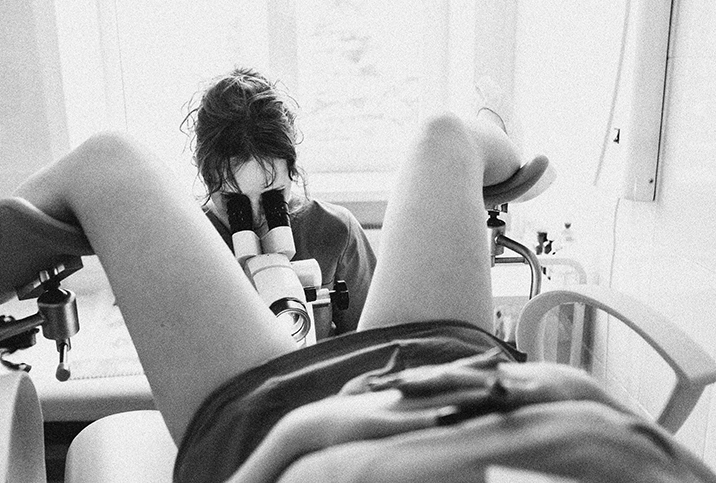Why Finding a Sex-Positive OB-GYN Can Make All the Difference

There is quite possibly no worse moment to be slut-shamed than with your feet in cold metal stirrups and your vagina exposed under a fluorescent light. Unfortunately, receiving judgment from a medical provider happens all too often—especially at the OB-GYN office.
Being slut-shamed—receiving criticism for sexual partners, promiscuity or sexual behavior—at the OB-GYN can cause a lingering emotional toll that may impact how likely someone is to disclose their history to providers or return for an appointment in the future. If someone is less likely to return to an OB-GYN after experiencing judgment for their sex life, they could miss out on lifesaving preventive screenings.
A 2014 study by the University of California, San Diego, sought to explore patient reactions to physician-inspired shame and guilt. The study opens with the fact that more than one-third of all deaths in the United States are basically preventable. The research indicates that more than half of the respondents reported experiencing shame over their sexual habits. Gynecologists were commonly cited as inducing this shame.
How physicians handle sensitive subjects bears more weight than you might think.
What does it mean to be sex positive?
"Sex positivity is not the same as sex promotion," explained Olivia Harris, executive director of the sex education organization Speak About It, based in Portland, Maine. "Sex-positive doctors ask questions that are open and inclusive without shame, hold space for experiences beyond our cultural gender binary, use the language that suits their patients, and stay sensitive to boundaries that might come up."
Sex positivity is a framework that utilizes sensitivity for individual preferences. Sex positivity is also a rejection of upholding the cultural taboo of talking about sex, specifically the enjoyment of sex. Sex positivity is anti-shame with deep respect for bodily autonomy, whether someone has many sexual partners or chooses to be celibate.
A sex-positive OB-GYN is open and accepting of many different types of people who may have vulvas, vaginas or uteruses, said Emily E. Prior, M.A., executive director of the Center for Positive Sexuality in California and a professor of sociology and psychology. "A patient who is looking for a sex-positive OB-GYN is looking for someone who sees them as a whole person, respects their identity, and is supportive of the type of care they are seeking."
The impacts of a negative experience at the OB-GYN
After a year of using a copper IUD, Kay McAnally (a Giddy employee) went back to the OB-GYN for its removal due to recurrent yeast infections and painful and heavy periods. When McAnally revealed how many partners she'd had, the doctor told her, "You shouldn't get your IUD removed."
"I was horrified that she would encourage me to continue using a form of birth control that was causing my body harm rather than helping me become healthy and safe," McAnally said.
Instead of hearing McAnally's concerns and removing the IUD, the OB-GYN proceeded with a Pap smear and was condescending when it came back abnormal, McAnally said.
"[That] made me feel like I had done something terribly wrong and shameful, rather than [she] explaining I had a very common [sexually transmitted infection] that would probably go away," she said.
The internet is littered with questions and worries from people about the negative ramifications of openly communicating about their sexual practices with their doctor.
In response to the encounter, McAnally rethought her level of openness with the OB-GYN.
"I rounded down my number of sexual partners and chose not to tell her about questionable decisions I had made," she said.
McAnally isn't the only one who has experienced shame or fear of being shamed at the OB-GYN. The internet is littered with questions and worries from people about the negative ramifications of openly communicating about their sexual practices with their doctor.
Having a negative encounter at an OB-GYN might also equate to a provider who is not welcoming of varying identities, which could manifest in automatically assuming someone's pronouns or sexual identity, or passing judgment on queer or other marginalized identities such as sex workers.
How can you find a sex-positive OB-GYN?
Unfortunately, there is no directory of sex-positive OB-GYNs to date, but there are telltale signs that might indicate someone is sex positive.
For example, McAnally has since found a supportive provider.
"I knew my current doctor was a good fit when she treated me like a human rather than a diagnosis," she said.
Prior advised that you should start by checking out a provider's training and background.
"Anyone in this position should be sex positive, but this is not really a part of the general training," Prior said. "Look for indications they have also had training and experience with LGBTQIA+ patients and related marginalized sexual identities."
Intake forms can also offer a gauge as to how inclusive a provider might be.
Doctors should keep an even to pleasant tone, not express any negative emotion, and should definitely not shame a patient for their choices or identity.
"At the very least, the OB-GYN themselves should have intake forms and questions that do not assume all people with vaginas and related reproductive organs identify as female," Prior said.
Providers should be open to their patients having a variety of sexual practices, including but not limited to multiple partners, practicing BDSM and/or being sex workers, Prior added. Providers also shouldn't presume any increased health risks because of these activities.
During the appointment, broaching the subject of sexual history with care should be paramount, and it's also a conversation a doctor likely needs to bring up first.
"Patients are unlikely to speak about any sexual health issues, even with a sexual health professional, unless the doctor initiates the conversation," Prior said.
A provider's disposition when receiving sensitive information is just as crucial as not passing judgment. Prior said doctors should keep an even to pleasant tone, not express any negative emotion, and should definitely not shame a patient for their choices or identity.
What role does shame play in health outcomes?
The aforementioned UC San Diego study found 45 percent of patients who experienced shame reacted negatively by either terminating treatment with, avoiding or lying to their physician as a result of the incident.
The patient's perception of the doctor's intent is just as damaging as the actual experience of being shamed, said Christine Harris, Ph.D., professor of psychology at UC San Diego, in a press release about the research.
"If you perceive your doctor is intentionally trying to make you feel shame or guilt, then the reaction is exclusively negative," Harris said.
Medical trauma has lasting implications for emotional and physical well-being.
A sex-positive provider meets someone where they're at rather than passes judgment, which helps open the door for conversations about safe sex and contraception with a compassionate attitude.
"Research shows that patients who have had negative experiences with health professionals of all kinds are at higher risk for mental and physical health issues later on," Prior said. "They are unlikely to seek help in the future when needed and may suffer directly from any shame or other negative aspects of the encounter.
"Even if the negative experience was with an OB-GYN, the bad feelings may carry over to seeking any professional health care, and this can be detrimental to maintaining positive physical, emotional and mental health," Prior continued.
The study concluded by noting the dangers when doctors broach sensitive topics with patients, and hypothesizes that one way to ensure better health outcomes is to have open-ended communication and allow patients to make their own conclusions about their behavior.
A sex-positive provider meets someone where they're at rather than passes judgment, which helps open the door for conversations about safe sex and contraception with a compassionate attitude. Sexual health is, after all, a large reason people are at that appointment in the first place.


















